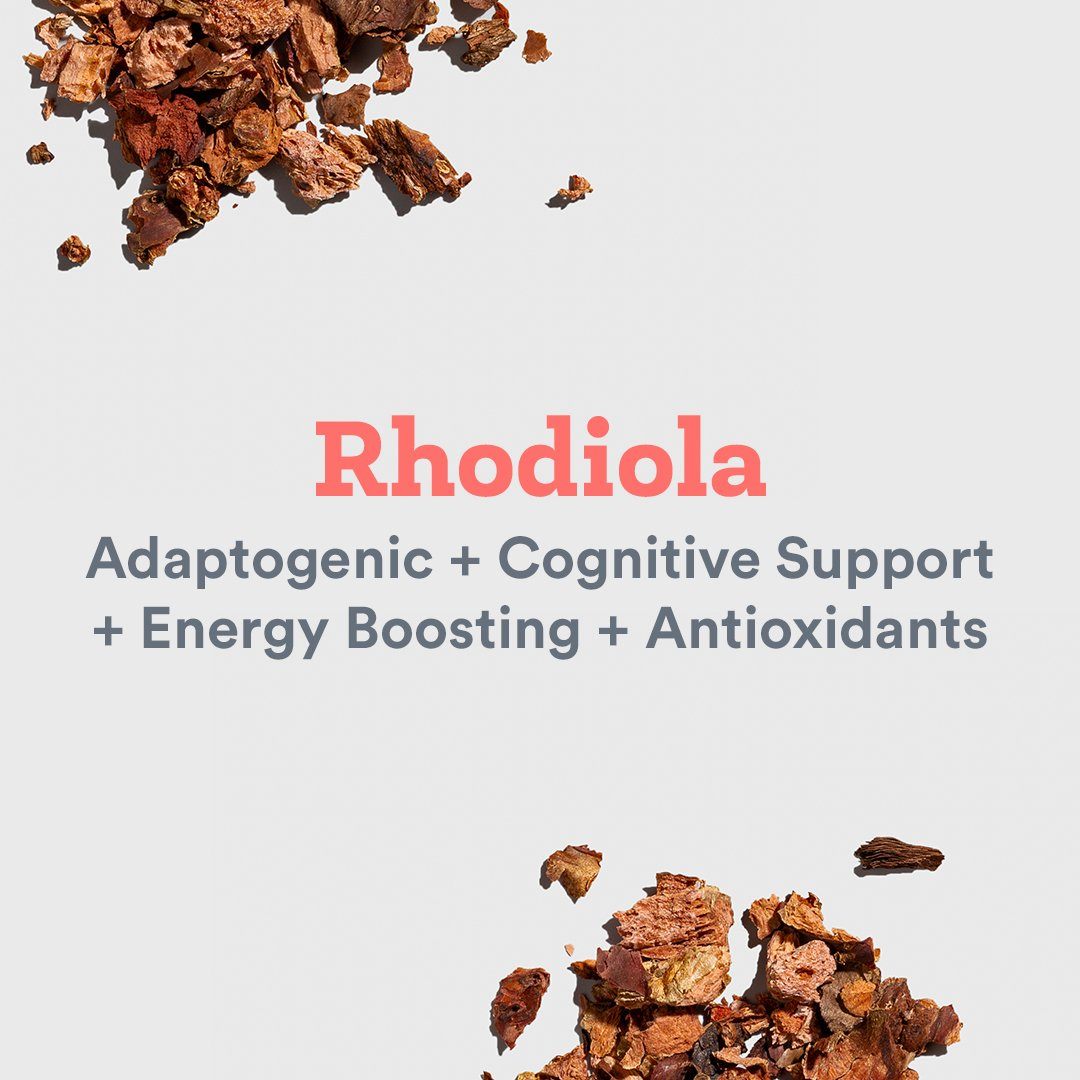
Scientific/Latin name: Rhodiola rosea or Sedum rosea
Also known as: Golden root, Roseroot and Arctic root
Native to: Asia, Europe and other areas of the Northern Hemisphere.
Parts used: Root
Top benefits: Adaptogenic, Energy boosting, Cognitive Support and Antioxidant Rich

Rhodiola, the Resiliency Herb
Rhodiola is an adaptogenic herb with brain-supporting and energy-enhancing power. It has been used for centuries in the traditional medicine of countries including Russia, Siberia and Scandinavia, for a number of actions, including to increase physical endurance, work productivity, longevity and resistance to high altitude sickness, and to treat fatigue, impotence, gastrointestinal ailments and nervous system disorders. Vikings reportedly used the herb to enhance their physical strength and endurance. In Traditional Chinese Medicine (TCM), Rhodiola belongs to the category of plants that stimulate blood flow, and is considered a tonic herb due to its key actions in replenishing Qi (vital energy or life force) and blood.
The traditional use of Rhodiola as a tonic in traditional medicine stimulated extensive research leading to its identification in the early 1960s as an adaptogen — revealing its ability to protect animals and humans from mental and physical stress, toxins and cold. In the last 60 years, it has continued to be studied extensively for various health-promoting effects.
The Health Benefits of Rhodiola
Adaptogenic
Rhodiola has been found to have a wide range of health-promoting properties that help increase the body’s resistance to stress (including antioxidant, anti-inflammatory, anti-fatigue, anti-tumor, neuro- and cardio-protective, and normalizing hormone and immune activity), resulting in its classification as one of the most active plant adaptogens. Rhodiola is considered one of the primary adaptogens for adrenal support, helping the adrenal glands produce stress hormones more effectively and efficiently, and is also considered an adaptogen with anti-inflammatory effects that can be used to provide relief from pain from arthritis.
Stress can also cause sleep-related problems, as excess adrenal output in response to stress disrupts the regular circadian (time-related) release of cortisol in the body. Since Rhodiola can help the adrenals regulate cortisol production, it’s considered an adaptogen that can support better and more rejuvenating sleep and even help relieve the symptoms of jet lag, and is used in Herbal Medicine to regulate sleep disorders and improve quality of sleep.
Energy
Do as the Vikings did — one of the most popular uses of Rhodiola today is for increasing energy, stamina and strength. It has been found to increase stamina and oxygen capacity in healthy adults in endurance exercise tests. In cycling trials, it has been found to significantly lower perceived exertion and decrease heart rate response.(1, 2) In animal studies, supplementation with Rhodiola was shown to increase endurance, allowing the animals to swim 25 percent longer by increasing production of ATP, a chemical essential for cellular energy needed for muscle contraction and transmitting nerve impulses.
Rhodiola’s key actions in TCM include the stimulation of blood flow and replenishing Qi (vital energy). These actions support Rhodiola’s ability to help increase stamina and endurance, since red blood cells carry oxygen to muscles, helping to delay fatigue.

Cognitive support
Rhodiola is commonly used in Herbal medicine to help support cognitive function (including mental focus and stamina) and to reduce mental fatigue. Research suggests that Rhodiola can impact brain function via multiple mechanisms, benefitting both immediate cognitive performance and long-term brain function.
Its antioxidant potential, which helps protect cells against free radical damage and inflammation in the body, may in turn may help protect the central nervous system from damage that causes deterioration in brain function. It is also thought to enhance cognitive and learning function by directly stimulating neurotransmitters in the brain. Finally, it’s suspected that as an adaptogen, Rhodiola has positive effects on memory and cognition by increasing resistance to physical and emotional stress.
A number of clinical trials in healthy subjects demonstrate that Rhodiola extract exhibits an anti-fatigue effect that increases mental performance, particularly the ability to concentrate. For example, it was found to improve physical fitness, mental fatigue and neuro-motor tests in students under stressful examination conditions. Similarly, Rhodiola improved mental performance in the case of stress-induced mental fatigue in a group of doctors during night duty, positively impacting complex perceptive and cognitive functions, such as associative thinking, short-term memory, calculation, concentration and speed of audio-visual perception.

Antioxidants
Numerous studies have demonstrated Rhodiola’s high antioxidant potential. Antioxidants, compounds which play a vital, health-protecting role in human life, have been shown to help protect against various metabolic diseases, heart disease, brain disorders and age-related syndromes, as they help the body combat cellular damage caused by free radicals (reactive chemicals containing oxygen). Researchers believe that Rhodiola’s antioxidant potential may help protect the central nervous system from damage that causes deterioration in brain function.
JOYÀ products that use Rhodiola
The health research presented in this article is for informational use only. It is not a replacement for professional health advice and should not be construed as a recommendation of specific products. The products sold on this website are not intended to diagnose, treat, cure, or prevent any disease. This information does not provide dosage or format recommendations or possible drug interactions, and accordingly, should be used with the advice of a qualified health care practitioner.

